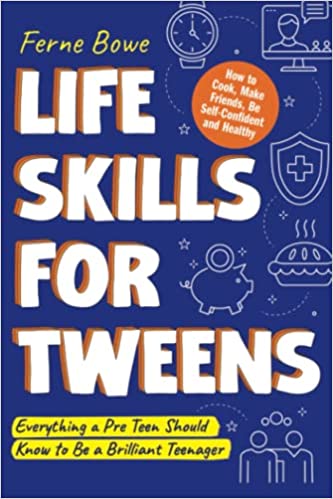Inside this post: It’s easy to feel like you are being too strict with your pre-teen, but you also want to ensure they stay safe. Here is how to know when to give your tween more freedom.

My son just turned eleven, and I’ve been leaving him home alone for awhile now. We started out in short increments, but now I can confidently leave him alone for a couple of hours at a time.
In the fall, he’ll be walking from his middle school to various activities after school, and this summer, we’re letting him ride his bike around town with his buddies.
He’s always been ready for more independence, but his little sister isn’t the same way.
Related: 10 Important Things Tweens Need from Their Parents Before the Teen Years
The tween years are about moving toward independence
The tween years are when many kids start begging for more freedom.
While some ask for it earlier than others, one thing to remember is that it is very normal for kids to start to want some time away from their parents.
This can begin at various ages because they’re all so different–which can make it difficult to know when they’re ready to do something or go somewhere on their own.
As parents, we obviously take their safety into high consideration because, at the end of the day, that’s what matters most. Some kids seem to have more common sense or perhaps are just more confident in their decision-making without parental supervision, but at the heart of it, giving more independence can be tricky because it’s challenging to know when.
Related: 10 Life Skills You Should Start Working on With Your Middle Schooler Today
Why is it important to offer more opportunities for independence to tweens?
The middle school years are a time of tremendous growth for your pre-teen. There are so many physical and developmental changes happening, and their behavior can shift seemingly overnight.
A lot of what you see on the outside is because of what’s happening on the inside–in your adolescent’s brain and with their hormones–during puberty. These changes can tremendously impact your middle schooler, who may just want to fit in although they constantly feel like they are sticking out. It also is why your once easy-going child may suddenly be a little saltier.
It’s critical to continuously provide your tween opportunities for more freedom and independence so they can figure out who they want to be in this world. This includes trying new things, making some of their own decisions, taking on more responsibility, and respecting their privacy.
Additionally, helping your tween to become more independent is a great way to help the teen years go smoother. Feeling independent can help your pre-teen boost self-confidence, develop resiliency, make good decisions, and regulate emotions.
Related: I Said Yes to My Tween’s Blue Hair Because Picking Your Battles is Important
How to know when your tween is ready for more freedom
Sure, some tweens are like my son, who basically begs for more freedom. But some are like my daughter, who does this back-and-forth tango—wanting to tip-toe with independence but also needing to hold my hand along the way.
There’s no right or wrong way to give your child more freedom; every child is different. Only you can know or decide when to give your tween more freedom.
So, just because we handle it one way with our first kid definitely does not mean it will be the same with our second and so on.
So, what are some ways you can know when your tween is ready for more independence?
Related: 10 Ways To Build A Strong Relationship With Your Tween or Teen That Lasts
Do Not Rely on Their Age
Age really is just a number. Two eleven-year-olds could be completely different when it comes to being left home alone for a couple of hours. One may be more than ready and has proven that they are responsible, and the other could be terrified. In some cases, a 10-year-old could be more developmentally ready for some freedoms before a 13-year-old.
So, if your tween’s friend is being left home alone, but you don’t feel that your kid is ready, you’re probably right to wait.
Does Your Tween Have the Skills for the New Freedom?
Let’s take the above scenario—leaving your tween home for a couple of hours.
Does your tween understand what to do and what not to do? For example, you know they won’t try to whip up a seven-course meal while you’re gone and accidentally start a house fire? Or, do they know not to leave the house or play outside?
Further, do they know where to go and who they can trust in the unlikely case of an emergency? Do they know how to contact you or someone else for help?
It’s vital to assess your child’s maturity and skills before giving them more freedom in a new area of development.
Does Your Child Have the Awareness and Confidence?
Awareness and confidence are essential when it comes to giving your tween more autonomy. If you are letting your kid walk home from school, for example, but they’re unsure of the directions or simply still act aloof, perhaps it’s too early.
But if your child is cognizant of their surroundings and also confident in the route they take, then it could be time.
Assess the Risks
As parents, it’s not pleasant to think about the risks that may come with giving our tween more independence, but it’s important we do.
For example, leaving your kid home versus letting them ride their bike to the local store have different levels of risk. But it’s vital to assess what could go wrong in each scenario while also discussing these possible events with your child. If they want more autonomy, it’s crucial they understand what could occur during this newfound freedom.
Listen to Your Kid
Some kids are hungry for more independence and vocalize it. They may ask to be left home alone while you go to the grocery store, walk to and from school, and more. If they are confident, it’s likely they’re ready, and this can help you know when to give your tween more freedom.
Other tweens may feel hesitant, and that’s okay, too. Just like anything else in life, we’re all ready for different things and different times. So, listen to the messages your tween is sending you.
Also, remember there are many ways to make your tween feel more confident and become more independent. Providing them with a list of chores like laundry or taking care of a pet, working on life skills like cooking, teaching them financial management, or even letting them choose how to spend some one-on-one time with mom or dad is a great start.
And Listen to Your Gut
The moment we become parents, an intuition is born within us. Sometimes we let society or the choices of others cloud our own judgment or make us ignore what we know is best for our own children.
If you believe your child is ready for more freedom, you’re probably right. If you think your tween is just not quite there yet, you’re probably right.
Trust yourself. You’re the parent, and you know best. Period.
Looking for a resource to help your tween become more independent? We love this book: Life Skills for Tweens.
Raising teens and tweens is hard, but you don’t have to do it alone. Here are some other posts parents found helpful:
9 Awesome Books to Help With Parenting During the Middle School Years
Sometimes Your Tween Will Bring Out the Worst in You
Here Are The Tech Rules You Need To Be Setting For Your Tweens and Teens







Leave a Comment